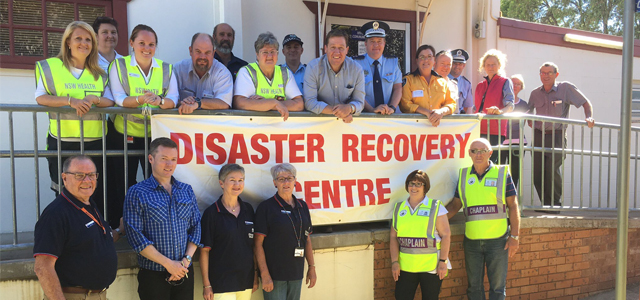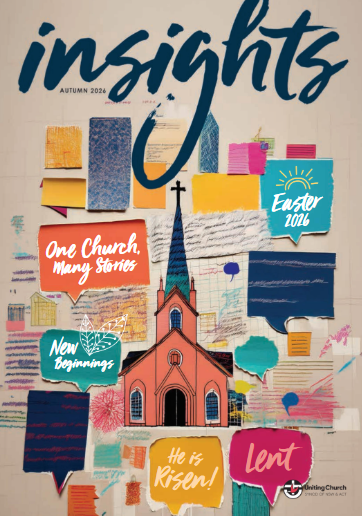Never before has NSW experienced the catastrophic fire conditions which ignited more than 90 fires throughout the state in the past weeks. The St Ivan fire near Dunedoo was so severe it generated its own extraordinary weather system in the form of lightening and erratic conditions which made it very hard to control. Over 54,000 hectares of farmland land east of Dunedoo were devastated, houses were destroyed and livestock perished in the wake of the fire’s ferocious path. Fortunately no lives were lost thanks to the extraordinary response of our rural fire and emergency services.
At the request of Disaster Welfare Services, when a major disaster hits the State, the Uniting Church coordinates and sends teams of ecumenical and interfaith chaplains through the Disaster Recovery Chaplaincy Network (DRCN) to evacuation and recovery centres to work alongside welfare agencies, offering pastoral support to members of the community.
When the first Rural Fire Service warnings came for the St Ivan fire, DRCN Chaplains swung into action at Coolah in the north-west Region of the State and in the days that followed, at the fire near Queanbeyan in the State’s South West. Vast amounts of the State were described as catastrophic and extreme.
Rev. Susan Phalen, Acting Sr. Chaplain and Duty Officer, was one of the Uniting Church Chaplains based at the Coolah Recovery Centre helping fire affected areas around Dunedoo, Leadville and Cassilis. Initiated by NSW Disaster Welfare Services, recovery centres and assistance points provide information, immediate emergency relief and support to people facing tragic losses.
As chaplains our work means “we are able to sit and hear people’s stories and see those sometimes very raw emotions that for much of the time they have to hold in check, simply to do what they need to do to get through to the business of the recovery,” said Susan.
Whilst Susan was in Coolah, Premier Gladys Berejiklian visited the Coolah centre to talk to local people affected and thank the emergency response teams and all those who fought the blazes.
While some areas are still on high alert, the recovery process for many has begun. Susan said, “it is now up to people to go about the task of cleaning up, including dealing with livestock removal, asbestos issues, and waiting for the local council to provide clearance to start all over again.”
“It is an emotional time for people as they go back to their properties to see what has happened. There will be ongoing work and a real place for Chaplains to be in the communities over time,” said Susan.
Help community bushfire recovery by giving to the Moderator’s Bushfire Appeal
In the coming months the Uniting Church hopes to sponsor more ministry agents in the fire affected areas. Overall the Church has 76 chaplains in the Disaster Recover Chaplaincy Network out of the 230 chaplains in the state.
It is in the aftermath of the fires during the many months of recovery when help is needed for people devastated by the bushfires to provide pastoral support in the region.
The best way to help is to send money (not goods).
If you would like to make a secure donation to the Synod Moderator’s Appeal and assist the Coolah and Queanbeyan communities recover from the bushfires you can give here. (All donations will be gratefully received but are not tax deductible.)
About the Disaster Recovery Chaplaincy Network
The DRCN is an ecumenical chaplaincy ministry which is trained and coordinated by the Synod under a Memorandum of Understanding with the NSW Government through the Department of Justice – Disaster Welfare Branch. For more information please contact stephenrob@nat.uca.org.au
Photo: Coolah Recovery Centre; Front right DRCN recovery Chaplains Susan Phalen and Jim Newton, with the Minister for Emergency Service, Hon. Troy Grant MP, middle back row and representatives from NSW Department of Welfare Services, NSW Mental Health Services, NSW Rural Adversity Mental Health Program, NSW Rural Fire Service, NSW Department of Primary Industries, NSW Family and Community Services, and NSW Police.






